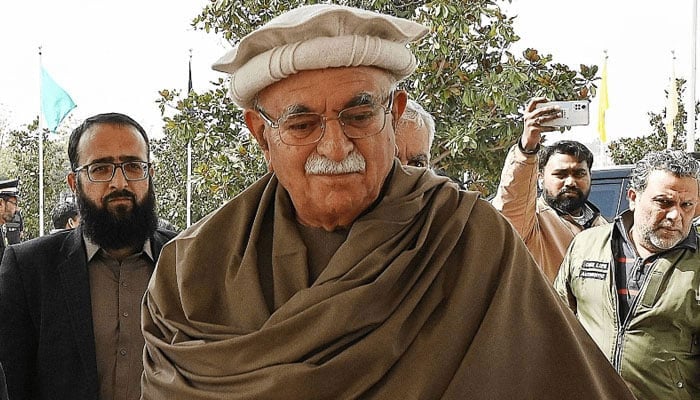PTI Protest
ISLAMABAD: As the Pakistan Tehreek-e-Insaf (PTI) prepares to launch its highly anticipated “do-or-die” protest in Islamabad today, the Mahmood Khan Achakzai-led opposition alliance, Tehreek-e-Tahafuz Ayeen-e-Pakistan (TTAP), has decided to abstain from participating, on Sunday.
According to insiders within both the PTI and TTAP, the opposition alliance’s leadership holds differing views on the protest’s timing and strategy.
TTAP leaders advocate for a coordinated approach involving all opposition parties to ensure maximum impact, unlike PTI’s unilateral decision to march to Islamabad.
They propose a mutually agreed date, a broader consensus, and a different method of protest, focusing on comprehensive preparation and nationwide mobilization before advancing towards any demonstrations.
This development comes amid heightened security measures in Islamabad. Authorities have sealed key roads, deployed additional personnel, and disrupted internet services in Islamabad, Karachi, Peshawar, and other cities to prevent PTI supporters from reaching the capital.
The stringent actions follow the Islamabad High Court’s (IHC) recent directive banning public assemblies in Islamabad due to the Peaceful Assembly and Public Order Act, 2024. The court issued this order considering the three-day official visit of the Belarusian president from November 25 to 27.
Despite these restrictions, PTI has resolved to proceed with its plans. During a meeting at the Khyber Pakhtunkhwa Chief Minister’s House, the party finalized its strategy, emphasizing its commitment to continue the protest until its demands, particularly the release of PTI Chairman Imran Khan, are met. However, the party has left the door open for negotiations.
Notably, TTAP leaders Mahmood Khan Achakzai, Sardar Akhtar Mengal, and Allama Raja Nasir Abbas have maintained silence on PTI’s march.
They argue that any protest aimed at restoring democracy, upholding the Constitution, and ensuring an independent parliament should involve all opposition parties, including Jamiat Ulema-e-Islam (JUI-F).
They suggest that nationwide protests should first build momentum, and a peaceful long march towards Islamabad should be considered only as a final step, provided meaningful dialogue is not achieved.
The sources revealed that PTI Chairman Imran Khan had instructed his party leaders to invite TTAP to join the march.
However, the opposition alliance reportedly declined the invitation. “It is our party’s decision to protest,” PTI Central Information Secretary Sheikh Waqas Akram stated when asked about TTAP’s absence. He refrained from explaining why TTAP leaders, who had actively participated in previous public meetings, chose not to support PTI this time.
Political observers speculate that PTI’s unilateral decision to protest without proper coordination with other opposition parties might backfire, potentially weakening its momentum and causing a political setback.
TTAP leaders remain firm in their belief that a well-organized, united movement is essential for achieving meaningful results.


